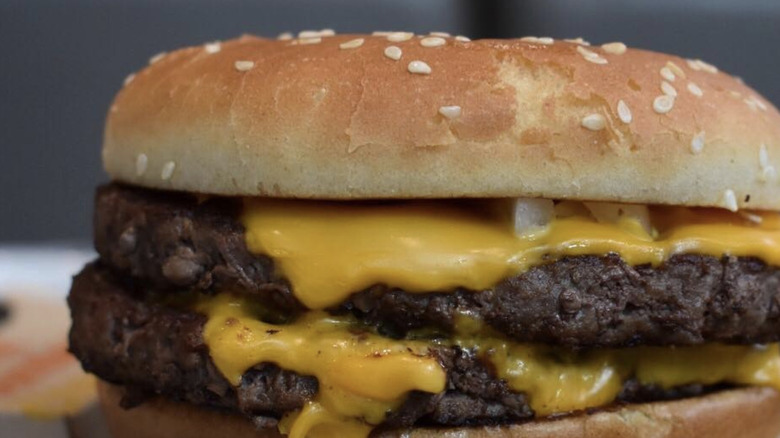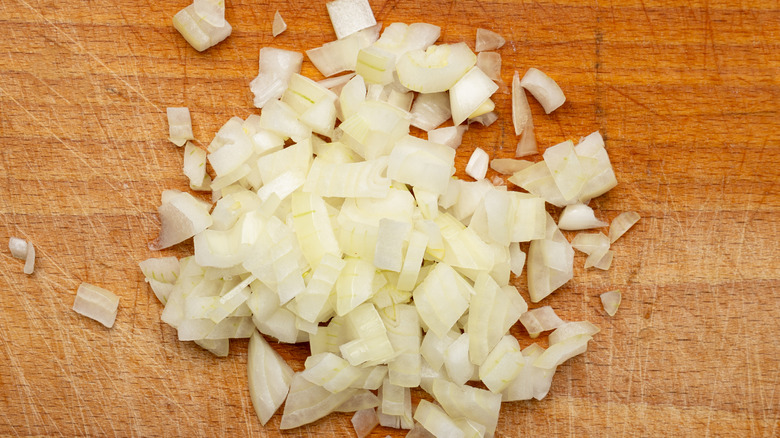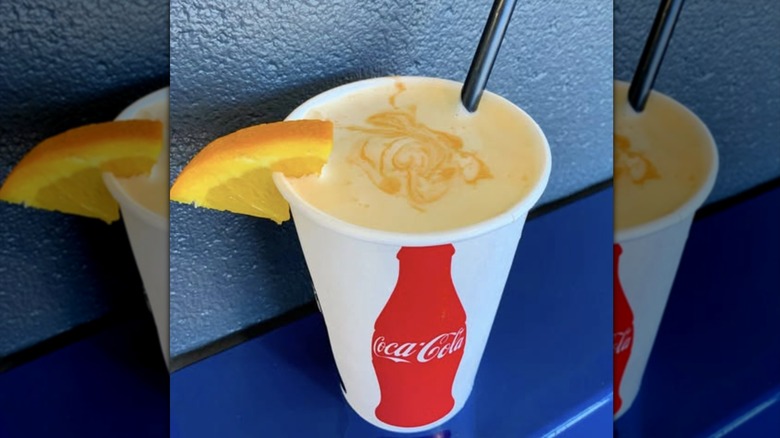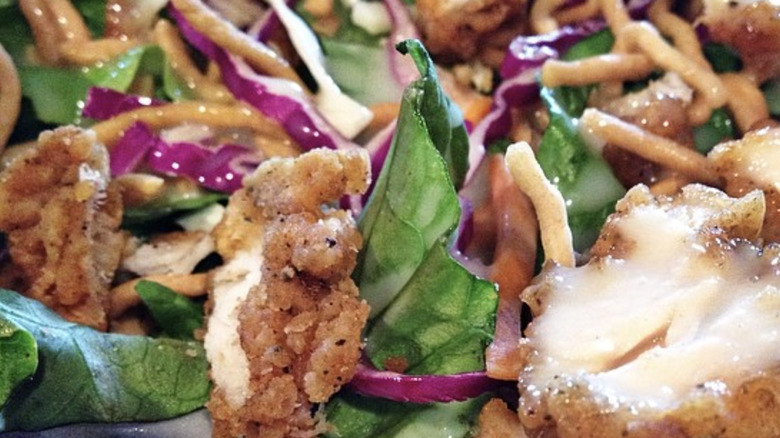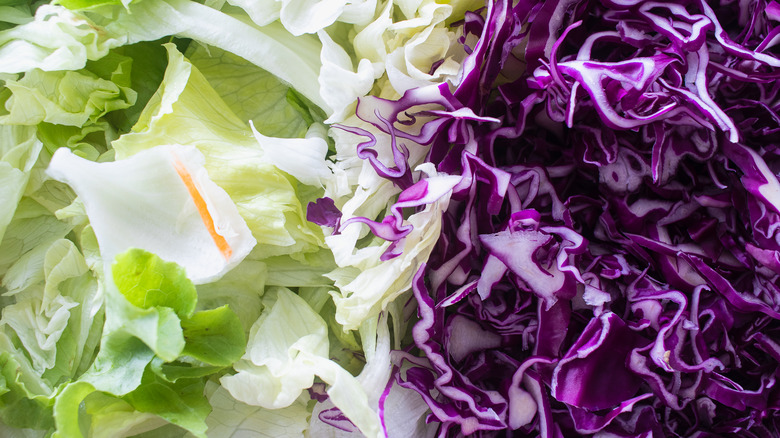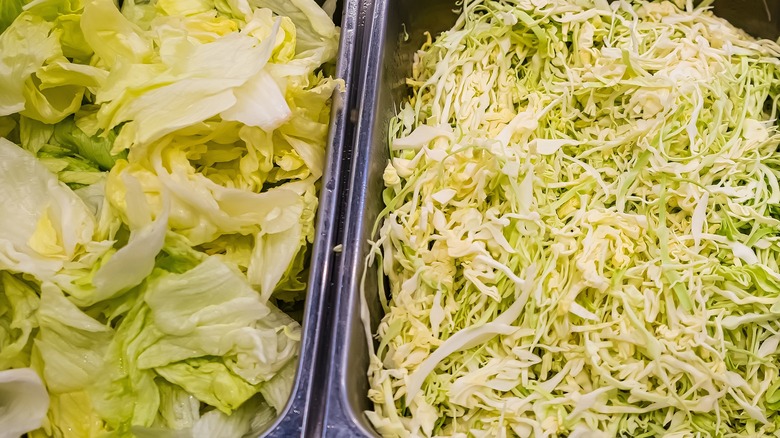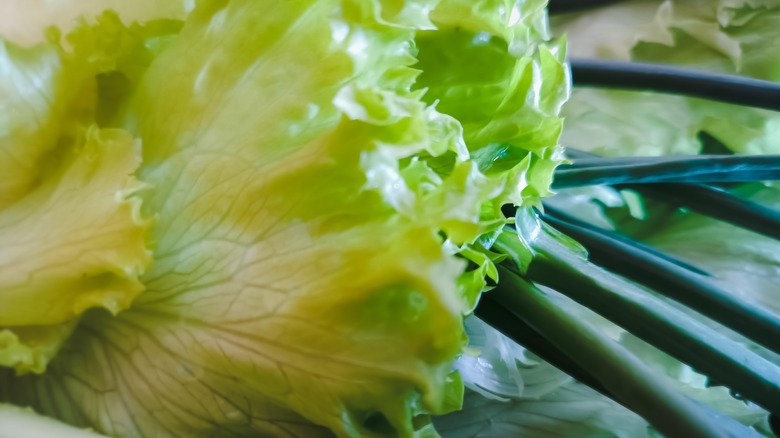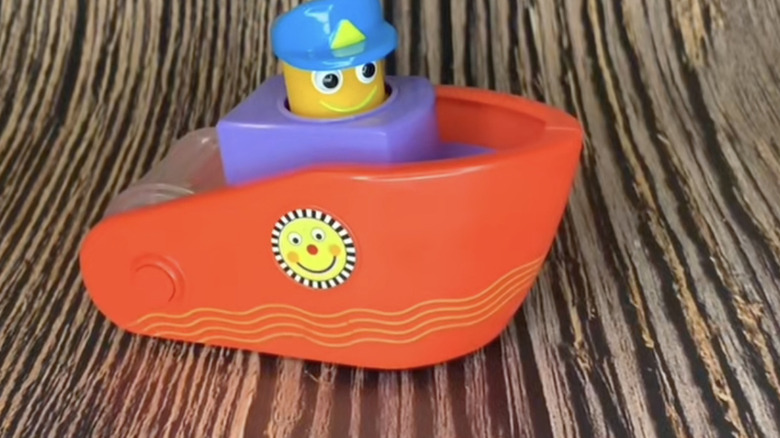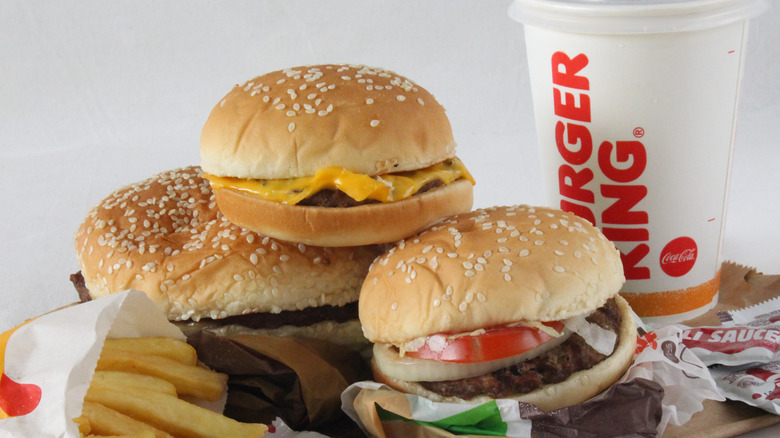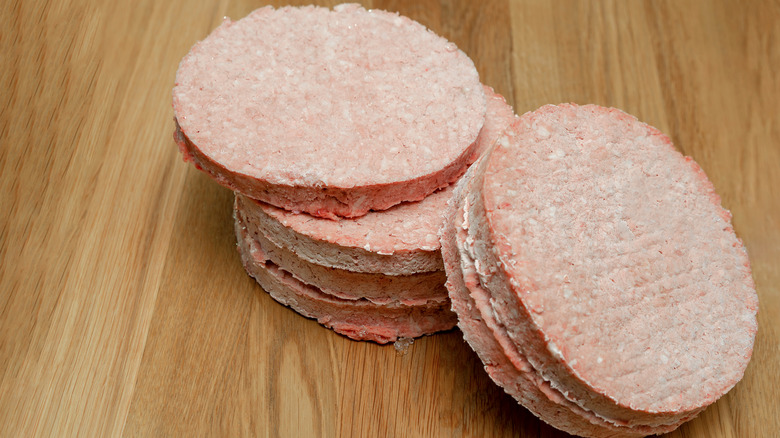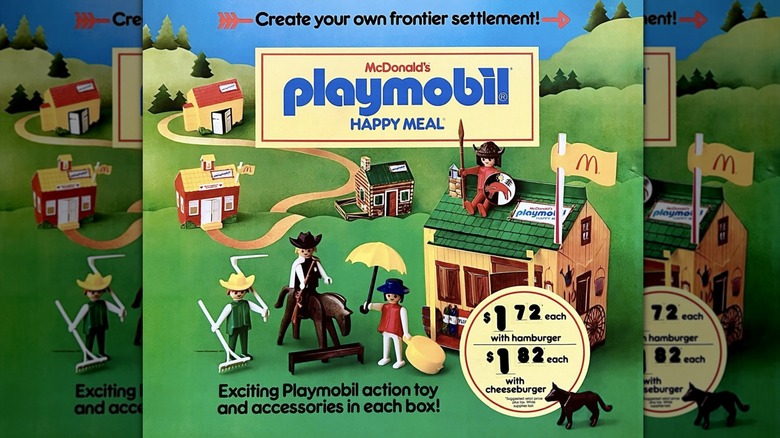The 12 Worst Chain Restaurant Recalls And Outbreaks In History
News reports of product recalls and food poisoning outbreaks have become so commonplace in the 21st century, it's enough to make anyone a little paranoid. For chain restaurants, troubles surrounding these unsavory topics have been decades in the making. Sometimes, the lack of food safety regulations were the reason why hordes of restaurant goers wound up getting seriously ill after visiting a local chain. In other instances, a shoddily made plastic toy thrown into a fast food kid's meal bag could result in a humongous recall — or even the death of a child.
These scenarios affect fast-casual sit-down chains and fast-food joints alike. What these businesses have in common is that they operate on a very large scale, and that involves trusting a whole lot of food growers, product distributors, and other commercial manufacturers. When the level of demand is that high, the chances of something going wrong increase as well.
In the U.S., federal organizations like the United States Department of Agriculture (USDA), Food and Drug Administration (FDA), and Centers for Disease Control and Prevention (CDC) are tasked with making sure that businesses aren't selling contaminated foods or faulty goods. The recalls and outbreaks we'll look at here demonstrate times when those systems failed, and people's wellbeing hung in the balance.
McDonald's onions in 2024
One of the most legendary fast food burgers was embroiled in disaster in fall 2024. Slivered yellow onions used on McDonald's Quarter Pounder burgers were behind an outbreak of E. coli O157:H7 that infected at least 104 people in 14 states. A total of 34 people were hospitalized. Four people who ate the contaminated onions developed hemolytic uremic syndrome (HUS), a condition that damages blood vessels and can cause kidney failure. An older individual in Colorado died.
On October 22, 2024, Taylor Farms, the company that supplied McDonald's with the onions, recalled 17,995 cases. McDonald's stopped putting onions on Quarter Pounders in the states that had been affected by the E. coli outbreak. Some locations stopped selling Quarter Pounders altogether. Meanwhile, Taylor Farms warned its other food service customers not to use the onions on any of their menu items. Taylor Farms' raw yellow onions were only distributed to food service retailers and were not available to the general public in grocery stores.
Taylor Farms provided more onions to McDonald's than any other restaurant, but other chains were also affected. Burger King, KFC, and Pizza Hut removed onions from select locations in response to the Taylor Farms recall. CNN reported that the E. coli outbreak led to a 10% drop in McDonald's visits nationwide and a 33% drop in Colorado. The fast food giant has invested $100 million in advertising in an effort to regain the public's trust.
Onions at IHOP in 2023-2024
Since 1958, IHOP has lured in customers who are looking for a tasty, comforting American meal. In late 2023, customers got something from IHOP they didn't order ... salmonella poisoning. In October 2023, three IHOP customers who dined at the Bellevue, Washington location came down with the same strain of salmonellosis. When inspectors from Public Health Seattle King County (PHSKC) visited the Bellevue IHOP in January 2024, they weren't able to determine where the salmonella bacteria had come from.
In February 2024, another IHOP customer became sick after dining at the Bellevue restaurant and PHSKC returned to take environmental samples. One of the samples tested positive for Salmonella Thompson, the same salmonella strain identified in the ill individuals. The Bellevue IHOP was temporarily closed multiple times so that deep cleaning could be performed. PHSKC identified 32 people who were infected with Salmonella Thompson between October 2023 and August 2024 — 22 of them had eaten at the same IHOP.
Health inspectors linked the IHOP outbreak to Gills Onions that had been recalled nationwide in October 2023 due to being contaminated by Salmonella Thompson. The recall accounted for 716,997 pounds of diced onions. Although the Bellevue IHOP discarded these onions, the bacteria was still present on multiple surfaces in the restaurant. The CDC has since declared the outbreak over and as of May 2025, the Bellevue IHOP is open.
Frugals milkshakes in 2023
Milkshakes are definitely a cheat day favorite, but nobody who indulges in one deserves to die. Sadly, that was the ill-gotten fate of three people who drank milkshakes from a Frugals restaurant in Tacoma, Washington. The regional budget-friendly chain is known for its old-timey, diner-style appearance and the retro fare to match. Burgers, fries and milkshakes are Frugals specialties ... well, not so much the milkshake part anymore. Frugals' milkshake-making legacy is forever tainted by the deadly listeria outbreak that stemmed from the Tacoma location in summer 2023.
Six people were hospitalized after contracting listeriosis — a serious foodborne illness associated with frozen and perishable foods — after consuming milkshakes from the Tacoma Frugals. Upon learning this, officials from the Washington State Department of Health set out to investigate what was going on behind the counter. What they found was two ice cream machines that were not properly cleaned, creating an environment in which listeria monocytogenes could thrive. Milkshake samples collected from the machines tested positive for the same strain of listeria that had sickened the hospitalized individuals.
Since the listeria outbreak was the result of negligence at the Frugals location, a product recall wasn't necessary, however, the Frugals in Tacoma stopped using the unsanitary milkshake machines on August 8, 2023. The six individuals who fell ill were between the ages of 40 and 70. All had underlying conditions that made them more vulnerable to the dangers of listeriosis, but only half survived.
Cabbage at Applebee's in 2014
The questionably-named Oriental Chicken Salad from Applebee's was at the center of a public health investigation in July 2014, when it was discovered that customers were leaving the restaurant with food poisoning. Officials from the Minnesota Department of Health began looking into 15 confirmed cases involving a strain of E. coli O111 that was uncommon in the U.S. Through interviews, they learned that 12 of the 14 individuals had dined at a nearby Applebee's. Nine Minnesota Applebee's locations and one Wisconsin location were named during the interviews. Many interviewees also stated that they had ordered the Oriental Chicken Salad.
Investigators determined that green whole head cabbage used in Applebee's Oriental Chicken Salad was the likely source of contamination. This prompted Applebee's to temporarily remove it and other cabbage-containing items from the menu. The Minnesota Department of Health believed that the cabbage was tainted prior to entering the restaurants and narrowed its traceback search to a handful of regional cabbage suppliers, including Jack's Produce.
Four of the individuals infected with E. coli required hospitalization. The FDA performed testing at some of the regional farms that may have played a role in the E. coli outbreak, but no recalls for cabbage were ever initiated. In August 2014, the first lawsuit against Applebee's in regard to the contaminated cabbage was filed.
A parasite in the salads at Olive Garden and Red Lobster in 2013
Between June and July 2013, Olive Garden and Red Lobster were implicated in a food poisoning outbreak that made hundreds of people sick. This time, the usual suspects — salmonella, E. coli, and listeria — weren't to blame. The culprit was cyclospora, a one-celled parasite that infects the intestinal lining. Health authorities investigating a rise in cyclosporiasis cases in Iowa and Nebraska traced the outbreak's origin to salad mix served at Olive Garden and Red Lobster restaurants in both states. The contaminated mix was grown by Taylor Farms de Mexico.
Taylor Farms CEO, Bruce Taylor stated that in June 2013 alone, its Mexican facility produced 48 million salad servings, but the farm's state-of-the-art water-testing equipment hadn't detected any signs of cyclospora. The mix was sold in thousands of restaurants in the Midwest and Eastern U.S. By August 2013, cyclosporiasis had sickened 418 people across 16 states. It was unclear whether the origin of all the reported illnesses were the same.
Salad mix at Olive Garden and Red Lobster wasn't recalled because state health officials assessed that the contaminated batches were no longer in the food supply. The FDA investigated Taylor Farms' Mexico facility and found that the hand-washing system for the growers was a potential source for cross-contamination. As 2013 drew to a close, over 60 lawsuits had been filed against Darden Corporation, which owns Olive Garden and Red Lobster, and Taylor Farms de Mexico due to the outbreak.
Taco John's lettuce in 2006
While Taco Bell locations on the East Coast weathered an outbreak of E. coli O157:H7 in November and December 2006, Taco John's was experiencing a near-identical catastrophe in the Upper Midwest. The statistics of Taco John's E. coli outbreak were concerning: 81 reported illnesses and 26 hospitalizations. In the face of federal lawsuits filed by E. coli victims and waning trust in the Taco John's brand, the company's CEO, Paul Fisherkeller stated that Taco John's insurer was willing to pay the medical bills of those who were sickened from eating at the restaurant.
Public health officials analyzing the Taco John's outbreak pointed to shredded iceberg lettuce as the problem ingredient — just like Taco Bell. On December 14, 2006, the CDC announced a public health alert for the E. coli outbreak linked to Taco John's restaurants in Minnesota and Iowa. One day later, an environmental investigation of two growing regions in California that had supplied Taco John's lettuce were set into motion.
One of the growing regions that investigators visited was Buttonwillow in California's Central Valley. Multiple environmental samples taken from Buttonwillow were a genetic match to the strain present at Taco John's. Investigators pointed to a complex water pipe system the Buttonwillow growers shared with a nearby dairy farm that lacked manure water backflow protection, which may have caused cross-contamination between the clean and waste water supplies.
Taco Bell veggies in 2006
Taco Bell had a serious problem in late 2006 — several of its restaurants were serving E. coli-laced food. A total of 43 cases of E. coli O157:H7 were reported across New Jersey, New York, and Pennsylvania. A majority of the customers who fell ill were under the age of 23. An 11-year-old boy who sustained kidney damage was one of nine people who were hospitalized. Testing of various produce items in affected locations led Taco Bell to pull green onions from all of its U.S. restaurants, despite evidence that green onions were the cause of the E. coli outbreak being less than concrete.
By December 12, 2006, the number of E. coli cases associated with Taco Bell rose to 71. The CDC, FDA, and USDA worked together to gain insight on which ingredient introduced E. coli into the restaurants. Further testing of green onions were negative for E. coli O157:H7, leading investigators to rule out onions as the contamination's cause. Instead, their analysis pointed toward shredded lettuce as a probable source.
At the time of the recall, shredded lettuce was an ingredient in 70% of Taco Bell's menu items. To minimize the outbreak, Taco Bell periodically closed 90 locations in order to thoroughly sanitize the environment and replace existing food supplies. Taco Bell tried to keep the name of its lettuce supplier under wraps, but firing Ready Pac Produce was pretty telling.
Chi-Chi's green onions in 2003
What happened at Chi-Chi's in 2003 was an outright tragedy. That November, Chi-Chi's decades-long reputation as a popular Mexican-American chain had to reckon with a devastating outbreak of hepatitis A that left around 600 people sick and three dead. Officials from the CDC and Pennsylvania Department of Health traced the virus' origin to green onions grown in Mexico. Chi-Chi's executives publicly lamented that testing nor produce-cleaning methods to ward off hepatitis A simply didn't exist. They weren't off-base. Public health authorities confirmed that the outbreak was not caused by wrongdoing on Chi-Chi's part.
Even so, the chain was saddled with one of the biggest hepatitis A outbreaks ever. In light of the outbreak, which was centered around mild salsa served at the Chi-Chi's location in Pennsylvania's Beaver Valley Mall, three green onion suppliers connected to Chi-Chi's had their shipments stopped at the border for FDA-led inspection. The outbreak's timing couldn't have been worse. On October 6, 2003, Chi-Chi's filed for Chapter 11 bankruptcy protection.
The ordeal motivated the Pennsylvania Department of Health to urge anyone who had dined at the Chi-Chi's inside the Beaver Valley Mall in late October to early November to receive an Immune globulin (Ig) shot to prevent hepatitis A infection. Approximately 9,300 people associated with the outbreak primarily or secondarily received the Ig shot in November 2003. In December 2005, a broke and beaten-down Chi-Chi's settled a class action lawsuit among nearly 5,000 claimants for $800,000.
Burger King Kid's Meal Toy in 2001
The free toys inside fast food kid's meals have caused problems over the years. For Burger King, some toys have been a source of mortal danger. In March 2001, the chain announced the recall of 400,000 "Rattling, Paddling Riverboat" toddler toys that were plonked into Kid's Meal bags between January 15 and February 13 of that year. As it turned out, the wheels on the paddling riverboat were rattling so much that they came unscrewed from the toy and make their way into innocent children's throats.
Choking hazards have long been a source of concern on the retail market, and Burger King was well-versed in these dangers before the 2001 recall. A year prior, Burger King included a Pokemon ball toy in its Kid's Meals that suffocated a toddler and killed an infant. Burger King execs claimed to have learned from the fatal incident, but its shoddy riverboat rattle wasn't matching up to executives' lip service. Ten parents issued complaints about the riverboat's faulty wheels but no injuries were reported. Burger King was quick to blame a manufacturing defect on Sassy, the toys' manufacturer.
The biggest takeaway from this recall was the need for fast food chains to disperse toys that are safe for children of all ages. By recalling the dangerous riverboats, Burger King put itself on the right side of harm reduction. It was a positive step from an industry that hasn't always held consumer safety in the highest regard.
Burger King beef in 1997
The recall and outbreak that befell Burger King in August 1997 was one of the worst fast food recalls in history. Burger King's beef supplier Hudson Foods recalled 25 million pounds of beef due to E. coli contamination, creating a lose-lose situation for the Nebraska-based manufacturing plant and its biggest customer. Immediately after the recall announcement, around 700 Burger Kings throughout the U.S. were relegated to serving chicken, fish, ham, and BLT sandwiches for roughly two business days until a new beef merchant could be secured.
The change in suppliers turned out to be permanent. Burger King severed ties with Hudson Foods in the midst of the recall. Former Hudson Foods employees claimed the break-up was fueled by Hudson Foods cutting corners in order to fulfill Burger King's large product demand. A July 1997 E. coli outbreak in Colorado unrelated to Burger King's restaurants was what prompted the nationwide recall and ultimately closed the plant down. Shortly after the recall, Hudson Foods was merged with competitor Tyson Foods.
Burger King may have been short of beef for a while but it was spared the pain of causing innocent consumers to get sick. Hudson Foods former director of quality control, Michael Gregory, faced criminal charges for allegedly lying to the UDSA about the details of the E. coli contamination which resulted in 15 reported illnesses in Colorado. Gregory and Hudson Foods were acquitted of the charges.
Jack in the Box burgers in 1993
1993 sparked a turning point with how chain restaurants handled food recalls and illness outbreaks. The Washington Department of Health (WDOH) began examining a cluster of illnesses associated with children who had been hospitalized with HUS, a potentially fatal kidney infection brought on by E. coli infection. It didn't take long for WDOH officials to realize that the sick children had eaten Jack in the Box hamburgers adulterated by E. coli O157:H7 bacteria.
Suspicion then turned to Jack in the Box's burger supplier Vons' Companies of California. Fecal contamination at Vons' slaughterhouse was believed to have tainted the meat the company shipped to Jack in the Box. The chain did not obligate Vons to test the meat for pathogens prior to shipment. In turn, Jack in the Box cooked the ground beef to 140 degrees — 15 degrees below the recently revised federal standard. Undercooking the bacteria-laden beef made over 700 people ill and resulted in the deaths of four children.
Jack in the Box's deadly outbreak fast-tracked the federal government's zero fecal tolerance mandate for beef carcasses. It also led to E. coli O157:H7 being officially declared as an adulterant to any food product. These initiatives incentivized meat manufacturers to employ more sanitary practices and preventive measures to keep these kinds of outbreaks at bay.
McDonald's Happy Meals in 1982
McDonald's was a trendsetter in all the wrong ways when it launched the first major recall of a kid's meal toy in 1982. The chain's oversight of safety regulations was put on blast when its Happy Meal promotion of Playmobil toys was putting children under the age of 3 in danger of choking. The plastic figurines contained small pieces that could be removed and easily swallowed by toddler-aged children, and were not up to the U.S. Consumer Product Safety Commision (CSPC) standards, resulting in the recall of 10 million units.
Thankfully, no reports of injury were reported in conjunction with the toys' release. Customers were given the option to return the Playmobil toys in exchange for a box of McDonld's cookies, a soft serve cone, or a refund. This early recall would prove to be a challenging lesson for McDonald's to learn, Over the years, several other Happy Meal toys would be recalled due to the choking hazards they presented.

